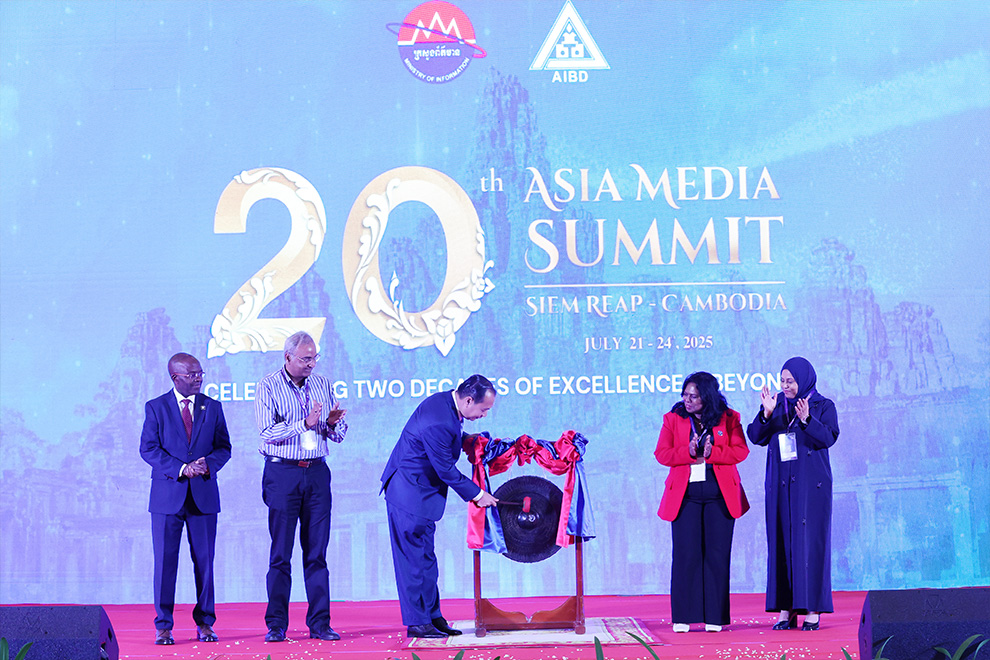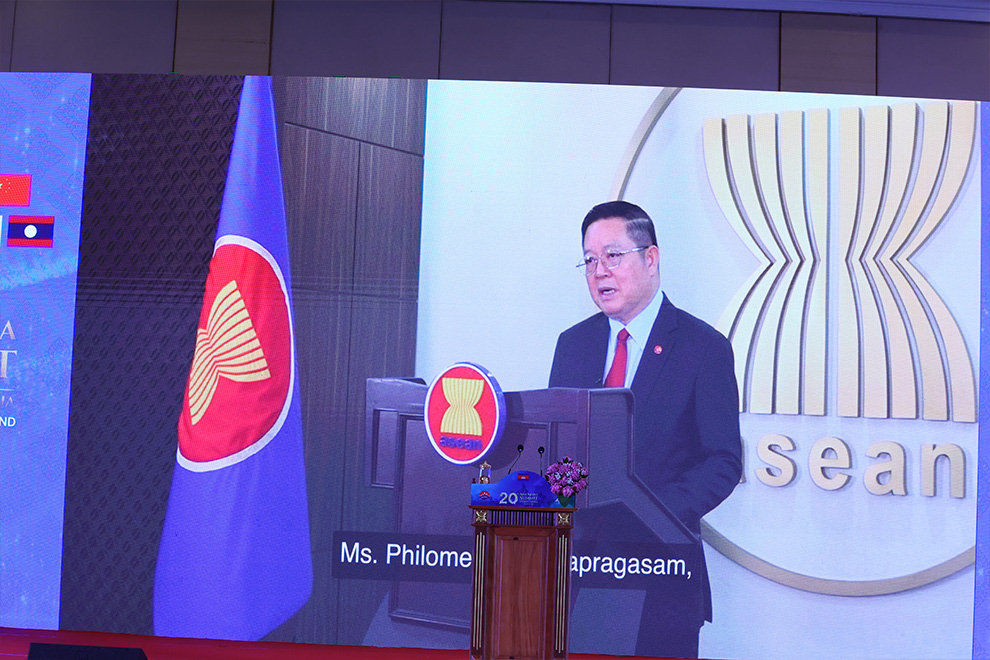July 23, 2025
PHNOM PENH – As the 20th Asia Media Summit (AMS 2025) launched in Siem Reap on July 22, a resounding message emerged from media leaders across the Asia-Pacific region.
The urgent need is to empower citizens with reliable information in an era increasingly dominated by disinformation, fake news and the transformative, yet challenging, rise of Artificial Intelligence (AI).
Gathered under the theme “Celebrating Two Decades of Excellence & Beyond”, the summit isa platform not just for looking back, but for charting a proactive course forward in a media landscape constantly reshaped by technology.
“We are living in an age of paradox,” noted Cambodian Minister of Information Neth Pheaktra, in his opening remarks.
“We are more connected than ever before, yet more fragmented in our understanding. Information is abundant, but trust is in decline. Technology has empowered citizen voices, yet also enabled bad actors to distort truth at scale,” he warned.
This sentiment was echoed by ASEAN secretary-general Kao Kim Hourn, who highlighted how the “unprecedented global media transformation has fundamentally changed how information flows across borders and communities”.
“Over the past two decades, the Asian Media Summit has evolved into the premier forum for media professionals, policy makers and academics across the Asia Pacific,” he said, via a video presentation.
He acknowledged that while innovation brings “promise and value”, it also presents challenges such as “information fragmentation, eco-chambers and the verbalisation of popular media brands”.
Kim Hourn believed the summit’s focus on media, information and actions are aligned perfectly with efforts to encourage regional cooperation in the media and information sectors by empowering citizens, safeguarding trust and fostering a well-informed and connected regional and public sphere. “These priorities will powerfully reinforce the ASEAN ministers responsible for innovation and resilience,” he said.

The information minister rings a gong to celebrate the opening of the summit, in Siem Reap on July 22. PHOTO: SUPPLIED/THE PHNOM PENH POST
The pervasive threat of disinformation was a central theme. Pheaktra detailed Cambodia’s proactive response with the launch of its nationwide “Say No to Fake News” campaign in April 2025.
The initiative combines civic education, fact-checking partnerships, media monitoring and grassroots outreach to “enhance public media literacy, strengthen journalistic ethics, and equip our citizens to distinguish between information and manipulation”.
The campaign aims to reach all 25 capitals and provinces by March 2026, engaging directly with citizens to cultivate “responsible digital citizens”.Beyond individual country efforts, a call for collective action resonated.
“No country — no matter how advanced — can tackle this alone,” Pheaktra emphasised. “The only viable path forward is collective action based on shared values, technological collaboration and principled multilateralism,” he added.

Kao Kim Hourn, ASEAN secretary-general, delivers an address to the attendees, via video. PHOTO: SUPPLIED/THE PHNOM PENH POST
Over the past 20 years, he said, Cambodia has transformed from a post-conflict nation into a peaceful, growing and modern country, with a revolution in its media landscape.
From a few radio and TV stations in the 1990s, Cambodia now boasts a diverse media ecosystem, including TV networks, print outlets, radio, digital platforms and citizen journalists,
He acknowledged that Cambodia is privileged to host the Asia Media Summit for the second time, six years after its initial hosting, in 2019.
Pheaktra said the landmark event arrives as the nation embarks on a new chapter, building upon the foundations laid by former Prime Minister Hun Sen, who championed press freedom and media development.
He said the country’s media evolution continues under the leadership of Prime Minister Hun Manet, who is spearheading reforms focused on digital transformation, professional integrity and ethical conduct to ensure media remains a pillar of truth and unity.

Hundreds of participants from 36 countries attended the launch of this year’s media summit. Supplied 2025 in Siem Reap. PHOTO: SUPPLIED/THE PHNOM PENH POST
However, Pheaktra said, progress brings challenges. Cambodian media, like many in Asia, faces digital disruption: shrinking advertising revenue, rising online misinformation and a shift in content consumption.
“The Royal Government is actively supporting the digital transition, with national journalism training, infrastructure investments and collaboration with tech firms and journalism schools,” he explained. Additionally, he noted that Cambodia emphasises the importance of information integrity — access, quality and safety.
These principles are crucial for protecting reliable, accurate and timely information, Pheaktra added, adding that Cambodia urges AMS member states to uphold the right to information, improve freedom of information and ensure access for marginalised communities.
A new frontier in this fight, and a significant point of discussion, is the integration of AI into the media industry. While recognising its potential for revolutionising content creation and distribution, leaders also acknowledged its inherent risks, such as “deepfake manipulation, data bias and automated misinformation”.
Gaurav Dwivedi, President of the Asia Pacific Institute for Broadcasting Development (AIBD), highlighted the opportunities. “AI product tools are transforming our communication, user management and audience engagement,” he explained.
“At Prasad Gallery, we have begun piloting AI-driven solutions into our newsrooms, automating the content curation, enhancing app-checking and personalising your experiences,” e added.
Dwivedi mentioned that AI innovations enable curators to focus on storytelling while ensuring accuracy and speed.
He also highlighted the creation of summit workshops on AI in media, discussing the opportunities, challenges and transformation of communication through AI algorithms.
He expressed confidence that these efforts would equip teams with essential skills in digital journalism, data storytelling and digital equality.
As the media landscape evolves, he emphasised that universal access remains central to service broadcast, pointing out that digital initiatives have expanded reach and improved quality, ensuring credible news, education and entertainment for all, regardless of geography or race.
However, the ethical considerations remain paramount. Pheaktra put forward a bold proposal.“I propose that this summit begin discussions on a joint regional charter for AI ethics in journalism — one that upholds transparency, fairness and respect for human dignity,” he suggested.
This reflects a growing consensus that technological advancement must be guided by human-centred values to truly serve the public good.The summit underscored the vital importance of media literacy and professional integrity.
Philomena Gnanapragasam, secretary-general/CEO of AIBD, reminded the delegates that while the summit celebrates how far they have come, it also serves “to remind us of how much further you can go”.
“Now this is the most deep meaning for all of us here because we are not just marking a milestone that might shape the future here in the Asian Pacific and the US,” she added.
Ultimately, the AMS 2025 served as a powerful reminder of media’s fundamental purpose.
“The future of media is not just about speed or innovation — it is about values,” Pheaktra observed.“In an era where virality often trumps veracity, we must re-anchor media in its fundamental purpose: to inform, to empower, to inspire and to unite,” he said.
The commitment from leaders at AMS 2025 signals a determined push to ensure that in the ever-evolving digital landscape, citizens are not left adrift in a sea of misinformation but are instead empowered with the truth and the tools to navigate it.


